1977 Gibson Super
400CES
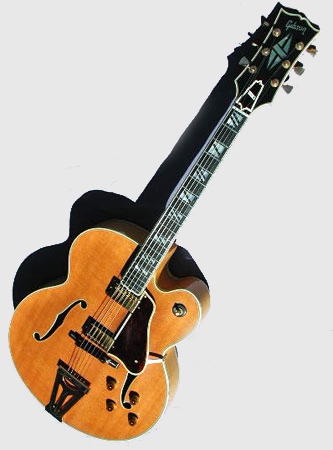
Price and Status: For pricing and hold status of this instrument,
please check here. If this instrument does not appear on the
Instruments page it has been sold. To be notified of examples of this or any
other model in the future, please email your specific requests to info@archtop.com.
Serial #: 06100789
Body size at lower bout:18" Scale length: 25-1/2" Nut width: 1 11/16'
Materials: Hand carved book matched solid spruce top; highly figured tiger flame maple neck; hand carved book matched
Birdseye Maple Back; flame maple sides; ebony fingerboard with mother of pearl block fingerboard and Peghead inlay; 5-ply body,
neck, head and pickguard binding, bound f-holes, bone nut.
Hardware: All original hardware, including engraved gold-plated tailpiece; gold Tuneamatic bridge with dark Brazilian
rosewood base; original gold Kluson Sealfast tuners and double Humbucking pickups; extra gold bell knobs included (black
originals in case); 3 position selector switch, truss rod cover with "Custom" imprint, gold Gibson bonnet volume and tone knobs.
Notes: Introduced in 1934, the Super 400 is the pinnacle of the Gibson line, the largest and most expensive production
guitar of its era. The electric CES version made its debut in 1951, and remains in the catalog to this day. With its deep amber
blonde finish, this guitar shows deep tiger-flame figure in its three-piece neck, and attractive hand carved rock maple in the
back. The top is beautifully book matched of lovely fine grained solid hand carved spruce.
This guitar is in immaculate original condition, without cracks or repairs, and all original finish without pick, buckle or
thumb wear. Plating is nice and bright, and the original Hardshell case contains the original warranty certificate and wallet
card. The neck is in the traditional style, with the standard 1 11/16" nut width, 17 degree headstock angle and without the
volute "bump" of some examples. A great player with the huge, fat tone only the Gibson Humbucker can produce, this guitar is as
big, blonde, and beautiful as they come.
Setup: This instrument is strung with medium gauge nickel strings (.013-.056). The guitar will accommodate lighter or
heavier gauge strings, according to preference. String action is set at 5/64" to 6/64" at the 12th fret, with moderate relief
for acoustic playing with medium strings. The action may be lowered or raised to your requirements with the adjustable bridge.
Case: Original Gibson Black Plush Hardshell Case.
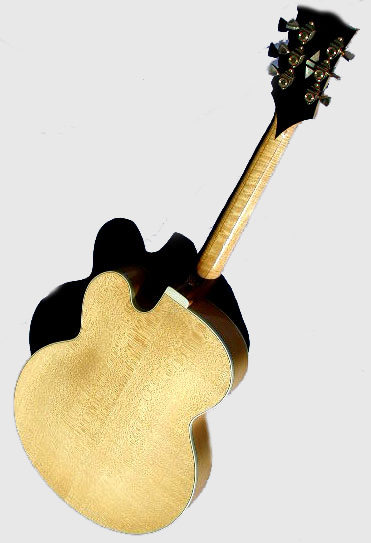
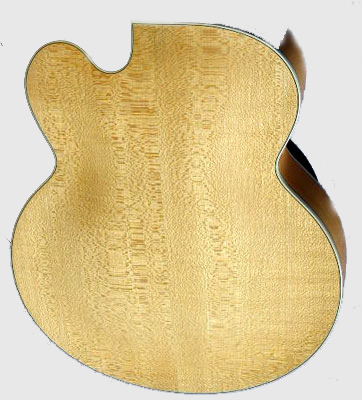
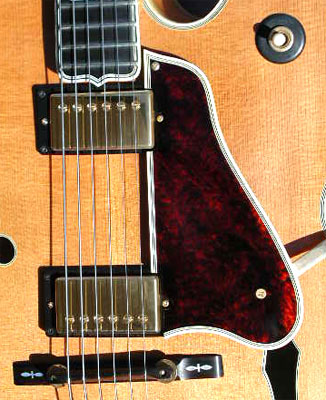
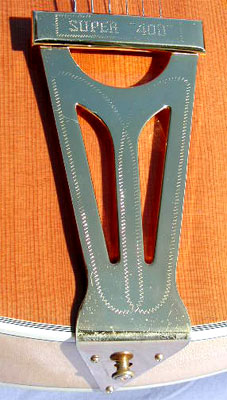
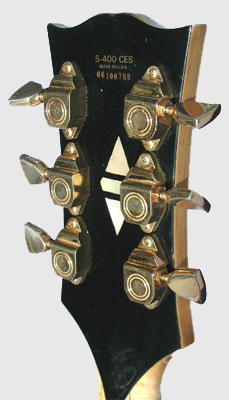
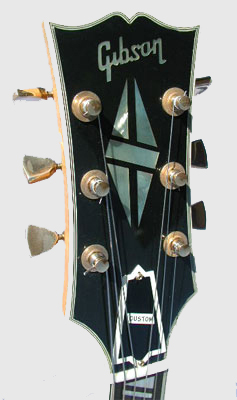
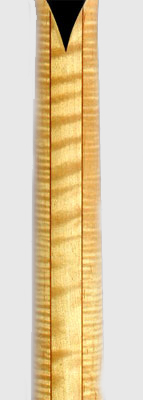
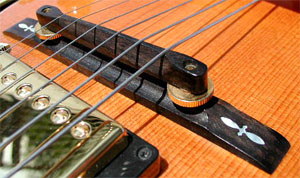
Gibson Super 400
(1934 - 1955)
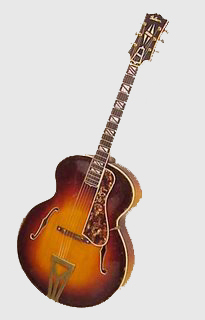
Gibson Super 400
( 1934 - 1955 )
Acoustic Archtop Guitar
One of the finest and most prestigious guitar Gibson ever made was introduced in 1923 and was called the Gibson
L-5 ,
it was the earliest Archtop guitar with f-holes and therefore considered the backbone of not only for their own
line of Archtop guitars but pretty much all Archtop guitars you see on the market today .
It is fair to say that the l-5 is probably the worlds' most important guitar historically . It was a favorite
amongst many professional musicians then , and a favorite ever since .
In 1934 Gibson made the music world over with another extraordinary guitar which was the
largest and most expensive Archtop guitar ever produced by any manufacturer or company.
This guitar was called the Gibson super 400,its
grand auditorium body shape shares the same characteristics like the Orville Gibson
Style-O
model of 1902 .
In 1934 the Gibson super 400 had an 18" wide body , an adjustable
bridge with triangular designs
, it was assembled with
figured
maple wood back and sides , fitted with a Y shaped tailpiece , had
triple bound f-holes , brown pearloid pickguards , ebony fingerboard with pointed ends ,
had double split-block fingerboard inlays , diamond Peghead inlays , open back Grover tuners , gold plated
hardware, most of them had the model name engraved on the heel cap , and were made in brown sunburst finishes .
Important : The very first super 400 batches had "
Super L-5
" engraved on the truss rod cover and " Deluxe L-5 model " written on the label . These guitars are extremely rare
and are known today as the "super
400 intro models" or " Super L-5 Deluxe " .
In 1939 the Gibson super 400 P (
premier ) originated , it had a single rounded cutaway , Kluson tuners with amber tulip-shaped buttons , were made
in sunburst finishes , natural finishes were also available and named ( Super 400 PN ) .
In 1940 Gibson introduced the super 400 N which was a natural finish version of the
original super 400 .
In 1941 production halted and was resumed after world war 2 in 1948 , the original super 400 and 400N stayed the
same , but the 400p was renamed the Gibson super 400 C ( C for cutaway ) .
In 1951 Gibson introduced an electric version of the 400c and named it the super 400 CES ,
it was equipped with 2 p-90 pickups and were the first Gibson electric guitars to feature the classic 2 pickup
circuitry ( 2 volumes , 2 tones , and a 3 way switch for pickup combination ) , this was another turning point for
Gibson as electric guitar amplification evolved after world war 2 .
In 1952 a natural finish version of the 400 CES was available and named the 400 CESN ( N
for natural )
In 1955 all super 400 non cutaway guitars were discontinued ( super 400 and 400N ) , the super 400 c and the super
400 CESN was discontinued in 1982 and the super 400 CES was discontinued in 1987 .
Some reissues and different versions were made later on through out the 90s as historic collection guitars or
custom shop super 400 guitars .
Vintage Price Value For 2008 :
1934 - 1934 > $35 000 to $40 000 ( Super 400 Intro Model )
1934 - 1941 > $14 000 to $18 000 ( Super 400 )
1947 - 1955 > $9 000 to $13 000
1940 - 1941 > $13 000 to $15 000 ( 400N )
1948 - 1955 > $10 500 to $14 000
1939 - 1941 > $30 000 to $35 000 ( 400P )
1939 - 1941 > $45 000 to $47 000 ( 400PN - Natural )
1948 - 1957 > $12 000 to $15 000 ( 400C )
1958 - 1965 > $9 000 to $13 000
1966 - 1969 > $9 500 to $10 000
1970 - 1982 > $6 000 to $9 000
1951 - 1953 > $16 000 to $19 000 ( 400 CES - P 90 pickups )
1954 - 1956 > $16 000 to $20 000 ( alnico )
1957 - 1962 > $25 000 to $30 000 ( PAFs )
1963 - 1964 > $16 000 to $18 000 ( Pat# )
1965 - 1987 > $7 000 to $10 000
1952 - 1956 > $25 000 to $28 000 ( 400 CESN )
1957 - 1962 > $28 000 to $35 000 ( PAFs )
1963 - 1964 > $17 000 to $21 000 ( Pat# )
1965 - 1969 > $11 000 to $15 000
1970 - 1982 > $8 000 to $11 000









